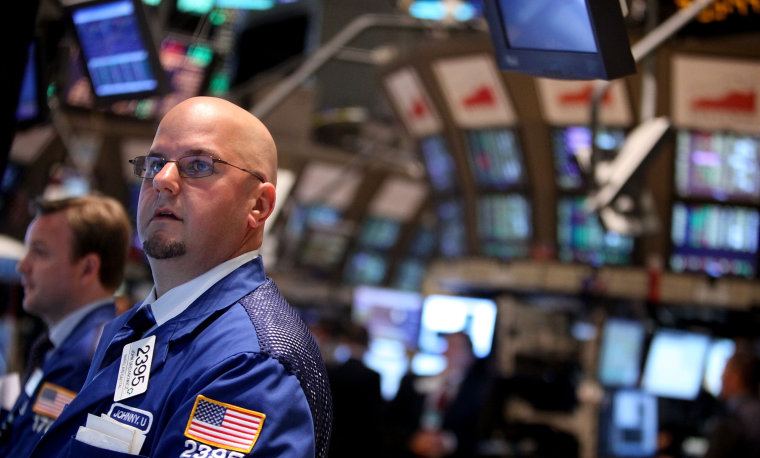If someone asked you to name the worst month for stock market performance you might say October. After all, that's the month when Black Monday and Black Tuesday occurred, marking the crashes of 1987 and 1929. Or perhaps you'd think May, in keeping with the old adage "sell in May and go away." You might be surprised to know September is historically the worst month for the stock market.
Last year the Dow Jones Industrial Average fell 6 percent.
That drop was unusual, but historically the index has fallen an average 1.4 percent in September since 1929.
Taking a broader look at the market, September is by far the worst month for the S&P 500. It has posted an average decline of 1.3 percent since 1929. Over that period, it's the only month to drop more than 50 percent of the time, said Sam Stovall, chief investment strategist at Standard & Poors.
Theories for surly Septembers are abundant.
Stovall believes people begin to pay more attention to investments after spending their summer "focusing more on their tans than their portfolios."
What's more, there's less capital flowing into investments in the last half of the year. Tax refunds and bonuses come in early and frequently go into an IRA or toward maxing out the 401(k) contribution.
Some market analysts believe mutual funds sell underperformers before their fiscal years end in October, while others focus on the mood of the investor.
"Psychologically, when the leaves turn in the fall, vacations end and the days are getting shorter, there is this kind of negative vibe out there that tends to accentuate any negative events," said Dan Seiver, a finance professor at San Diego State University.
So, investors don't wait, they just get rid of shares in companies they'd been contemplating getting rid of anyway.
It's a sort of emotional malaise that prompts the September market downturn, Seiver said.
There also may be some validity to the fact that many companies may not meet their earlier earnings guidance an end up revising downward, giving another blow to investor confidence and ultimately stock results.
One must also consider the possibility that if investors believe September is going to be bad they may sell off in anticipation, at which time it becomes a self-fulfilling prophecy.
Next month could prove to be an interesting one to look at from a historical perspective, said Larry Rosenthal, founder of Financial Planning Services, a Manassas, Va.-based investment management company.
The economic crisis has bottomed and it appears recovery is in the early stages. There are positive trends indicating housing values rising again and consumer confidence is edging upward. There are a few negatives, too, including persistent unemployment and consumers who are stubbornly sitting on their money, hesitant to spend in ways that would reinvigorate the economy.
"I think right now there is a tremendous amount of positive and negative data out there that is confusing the marketplace," Rosenthal said. "Not only do we have the historical month of September staring us in the face, but we're at a crossroads in the economy. Does this economy really have legs? Is it a recovery or a bear market run-up, we're still a handful of weeks too early to tell."
This all points to the fact that this year is anything but typical and perhaps it's wise to remain agile and prepared for anything, said Ethan Anderson, senior portfolio manager for Saginaw, Mich.-based Rehmann Financial.
"I think there's nothing the matter in this September and October time frame with being just a little leery," he said.
Some of his clients have set up triggers that allow them to change their allocation quickly if the market situation changes suddenly.
One factor that could contribute to a September downturn is the realization by investors that they've been a little too zealous, driving the market up 29 percent since March, and switch to sell mode. Anderson believes a small correction could be coming, but there is so much money on the sidelines right now that as soon as the market begins to head south those poised to jump could get in quickly, softening the downward impact.
"Investors are no better than hyperactive first graders playing musical chairs," said Stovall, the Standard & Poor's strategist.
Adam Bold, founder and chief investment officer for The Mutual Fund Store, a fee-based investment advisory service, finds humor in focusing on statistics. He says it's no more complicated than the fact that there are only 12 months in the year and there has to be a best one and a worst one.
"Somebody had to be September," he said.
Reading too much into historical trends can be a mistake. For example, an investor following the sell in May and go away philosophy this year would have missed out on some of the best monthly market gains in years. So, following old adages and playing the numbers games with statistics is no better than shooting craps, he said.
His advice: Stick with studying the performance of individual companies and buying the ones that have positioned themselves well in the recession by cutting expenses and managing resources well. That is likely to be a much more successful investment strategy as the leaves begin to change colors.
